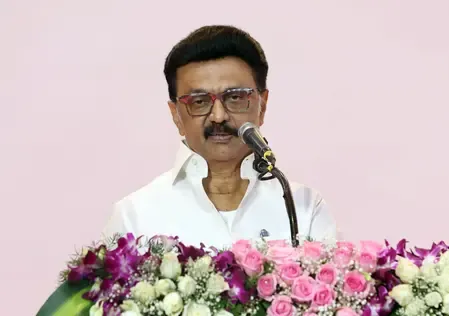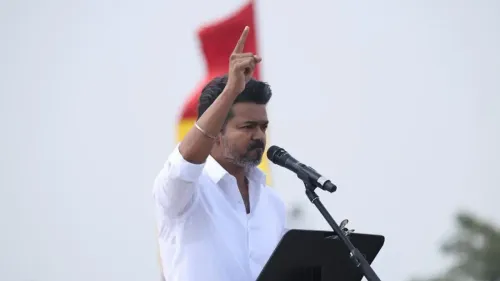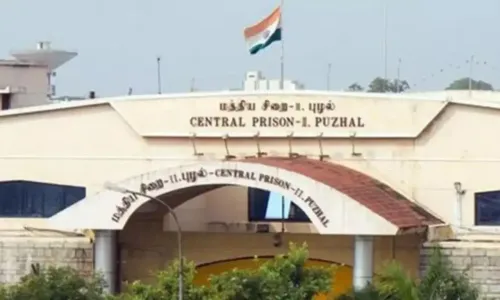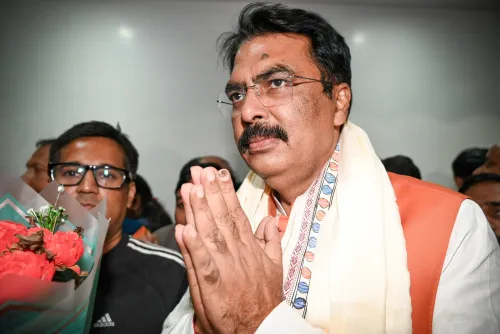MahaYuti Criticizes State Congress Chief for Comparing Fadnavis' Governance to Aurangzeb's Era

Synopsis
Key Takeaways
- MahaYuti legislators condemned Harshwardhan Sapkal's comparison of Fadnavis to Aurangzeb.
- BJP chief whip demanded a reprimand for Sapkal.
- Sapkal clarified his statement regarding governance issues in Maharashtra.
- Deputy Chief Minister Ajit Pawar urged members to avoid such comparisons.
- Historical references to Shivaji Maharaj were emphasized in the debate.
Mumbai, March 17 (NationPress) The MahaYuti members of the state Assembly expressed strong disapproval of Maharashtra Pradesh Congress Committee president Harshwardhan Sapkal's remarks that drew a comparison between Chief Minister Devendra Fadnavis's governance and that of the Mughal emperor Aurangzeb.
BJP chief whip Randhir Savarkar called for a reprimand from the state Assembly against Sapkal for likening Fadnavis to Aurangzeb.
Shiv Sena legislator Sanjay Gaikwad also criticized Sapkal's statement.
Deputy Chief Minister Ajit Pawar urged members to avoid such remarks, suggesting they were intended to please party leadership. He assured the Assembly: “We will investigate the statement and will take action if required.”
However, after a vigorous response from treasury bench members, Sapkal clarified: “The current harsh governance in Maharashtra is profoundly concerning. The horrific murder of Santosh Deshmukh, the Swargate rape incident, farmer suicides, and the rising violence against women depict a bleak picture of the Fadnavis administration. In this light, comparing Fadnavis's governance to that of Aurangzeb emphasizes the parallels between their regimes, not the individuals. Yet, some BJP leaders are now equating Fadnavis with the tyrannical Aurangzeb.”
Sapkal questioned why BJP leaders reacted so strongly to the mention of Aurangzeb.
“I did not use offensive language towards Chief Minister Devendra Fadnavis, nor did I disrespect him. Yet, BJP leaders are engaging in personal attacks against me. When I compared the governance of Aurangzeb and Fadnavis, it was the BJP leaders who claimed I was equating Fadnavis with Aurangzeb,” Sapkal stated.
He reiterated that he made the same remarks in Ratnagiri on Sunday and during the Sadbhavana Yatra in Beed district on March 9.
Responding to BJP State President Chandrashekhar Bawankule’s comments, Sapkal challenged him to explain how criticizing Devendra Fadnavis's governance undermines Marathi identity.
“Doesn't the disrespect shown to Chhatrapati Shivaji Maharaj and Sambhaji Maharaj harm Marathi pride? When Koratkar and Solapurkar insulted Shivaji Maharaj, why did Bawankule remain silent? The Congress Party upholds values. Santosh Deshmukh, the Sarpanch of Massajog, was a BJP booth-level leader. Yet, after his murder, BJP President Bawankule did not even visit his family to extend condolences. Instead, he sought to negotiate a settlement. In contrast, as Congress State President, I visited Deshmukh’s family and organized a Sadbhavana Yatra from there,” Sapkal elaborated.
“I come from modest beginnings, but BJP leaders such as Bawankule and Narayan Rane have resorted to personal attacks against me, revealing the true nature of the BJP,” he added.
Sapkal acknowledged that Aurangzeb was a cruel ruler but reminded everyone that Maharashtra's soil buried him, symbolizing the courage and legacy of Chhatrapati Shivaji Maharaj.
“Some factions are attempting to erase this history and the valor of Shivaji Maharaj. If Aurangzeb was cruel, so were the British. Will Bajrang Dal and Vishwa Hindu Parishad dare to dismantle statues, memorials, and institutions that honor those who supported the British rule?” Sapkal questioned.










